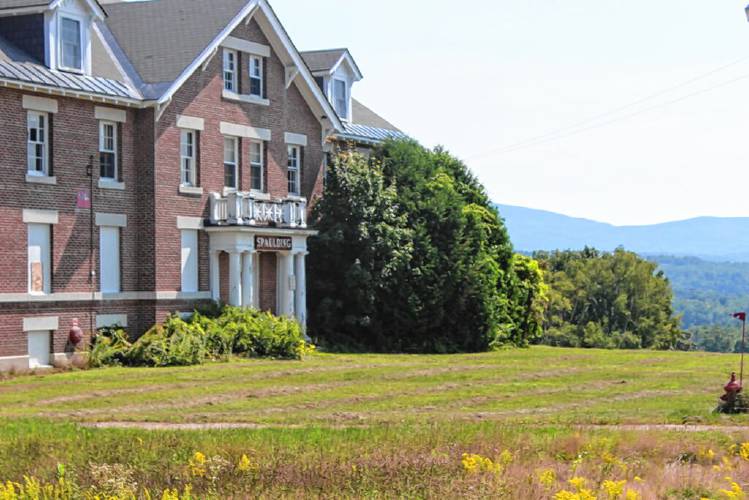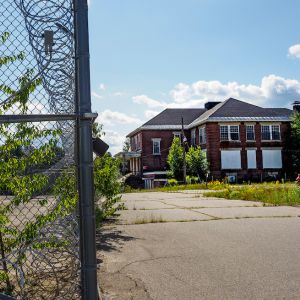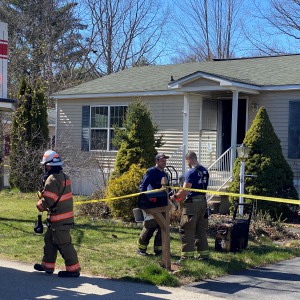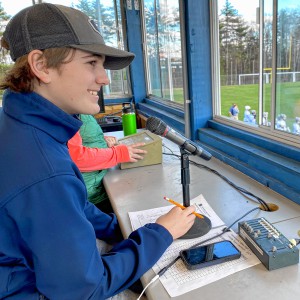State says its buyer has four weeks to ‘put up or shut up’ and close Laconia land deal

The Lakes Region Facility property in Laconia on Tuesday, Aug. 24, 2021. State officials said Wednesday that the property's chosen buyer, Robynne Alexander, has until April 22 to close on a $21.5 million land deal. Alan MacRae—New Hampshire Bulletin
|
Published: 03-28-2024 9:46 AM
Modified: 03-28-2024 2:12 PM |
The state has given its chosen buyer until April 22 to “put up or shut up” and close on a $21.5 million land deal for the former 220-acre Laconia State School property. The buyer and her team have requested three extensions since winning the bid to buy the land in 2022.
Commissioner Charlie Arlinghaus, whose Department of Administrative Services is overseeing the deal, made the announcement at the Executive Council meeting in response to questions from Councilor Ted Gatsas, one of two councilors who voted against selling the land to Robynne Alexander of Manchester and her team in December 2022.
Gatsas asked Arlinghaus if he thought the deal would “actually” close. “I think we’ll find out,” Arlinghaus said. Gatsas replied: “I found out 15 months ago and I told you it wasn’t going to.”
So far, Alexander has deposited $200,000 in escrow to extend the amount of time her team had to review the terms.
Scott Tranchemontagne, spokesperson for Alexander’s “Legacy at Laconia’ development project, expressed confidence it will meet the deadline.
“The Legacy team is working diligently with our new lender to finalize their process and secure the necessary funds to close the deal and transform this property into much needed housing for New Hampshire’s workforce, as well as community parks and venues, a retail center, and a resort which implements universal design for barrier free accessibility,” he said in an email.
Alexander and her team have extended closing date three times, initially over a demand the state relocate a snowmobile trail on the property to accommodate her plans, and, more recently, to secure a new lender after the first exited the project.
The delays have not only upset Gatsas but also concerned Laconia city officials who want assurances that if Alexander closes the deal she will see her proposed development – which includes 1,200 homes, a hotel, medical offices, and more – through. Fueling Laconia officials’ concerns are Alexander’s history of foreclosures, tax liens, and lawsuits from investors on other projects.
Article continues after...
Yesterday's Most Read Articles
 With Concord down to one movie theater, is there a future to cinema-going?
With Concord down to one movie theater, is there a future to cinema-going?
 “It’s beautiful” – Eight people experiencing homelessness to move into Pleasant Street apartments
“It’s beautiful” – Eight people experiencing homelessness to move into Pleasant Street apartments
 No deal. Laconia buyer misses deadline, state is out $21.5 million.
No deal. Laconia buyer misses deadline, state is out $21.5 million.
 Quickly extinguished fire leaves Concord man in critical condition
Quickly extinguished fire leaves Concord man in critical condition
 Concord police ask for help in identifying person of interest in incidents of cars being keyed during Republican Party event
Concord police ask for help in identifying person of interest in incidents of cars being keyed during Republican Party event
 Update: Victim identified in Lantern Lane fire in Concord
Update: Victim identified in Lantern Lane fire in Concord
Meanwhile, the state has plans for $16 million of the sale, which must be paid in cash, if Alexander closes the deal. And while Arlinghaus continued to voice cautious optimism at the Executive Council meeting Wednesday, emails between his office and Alexander and her team show the state has shared Gatsas’ frustrations with the delays.
Jared Nylund, who is overseeing the deal for the Department of Administrative Services, raised Alexander’s demand that the snowmobile trail be moved, contrary to her initial agreement with the state in a July 6 email to Laura Dodge, one of Alexander’s lawyers at McLane Middleton.
“From my perspective,” Nylund wrote, “this is a total U-turn in the buyer’s attitude about the trail – and I do not think it is a coincidence that it is only coming up now after someone on the buyer’s team prepared a conceptual development plan that includes or accommodates no snowmobile trails, relocated or not (yes, I have seen the plan).”
The sale of this property has been unusual. In 2021, Gov. Chris Sununu requested a law change that allowed him and the Executive Council to sell the property directly, without the typical state overview of property sales, a process that can be lengthy.
“We’ve dilly-dallied on the sale of this property for years,” Sununu spokesperson Ben Vihstadt said in 2021. “Let’s get it into the hands of someone who can do something productive with it.”
Alexander and her team offered the state nearly twice what three other bidders did. One asked the state to donate the property for community sports fields.
In their development pitch, Alexander and her team pitched a $500 million project that included 1,800 housing units, ranging from workforce housing to assisted living; a conference center that could accommodate 1,000 people; a 250-room hotel; as well as urgent care, pharmacy, and child care facilities.
Alexander told the Bulletin in December 2022, shortly after the state chose her as its buyer, that she’d never developed such a large project.
The Bulletin’s reporting revealed Alexander had a history of real estate problems, including tax liens in multiple communities; several lawsuits brought by investors; and three foreclosures. The most recent one was this month, on a $2.5 million Gilford property she purchased around the time she was selected to buy the Laconia property.
The team had scaled back the project by June, with 30 percent fewer housing units. The biggest decrease is in senior living, from 590 spaces for independent- and assisted-living and memory care to 195.
If the state closes the deal, more than half the $21.5 million would go to Concord developer Steve Duprey, who would get approximately $13 million for a property the state is currently renting in Concord.
The state Judicial Branch is paying about $380,000 a year for the top two floors in the north building at One Granite Place, with rent set to increase by $200,000 a year in 2027.
The $13 million would give the state all four floors of that building and the lobby that connects to an adjacent building where two other state agencies are renting space. The state is in negotiations with Duprey to buy that building as well.
The city of Laconia would receive about $3 million to help upgrade roads and its water and sewer systems to accommodate the 1,200 housing units, hotel, retail space, and medical offices Alexander has proposed.
Sen. Tim Lang, a Sanbornton Republican who sponsored legislation to provide that assistance, said this week that he wanted to avoid increased costs for taxpayers. He said Monday that he’s hopeful Alexander and her team close the deal – but anxious too.
“I think there is significant angst for this project getting through,” he said. “Everybody is getting frustrated with the delays. I want to see this happen, and I’d hate to have the deal fall through and have to go back to the drawing board and start all over again. If they say, let’s give them a couple of weeks to get their (financing) through, let’s do that. But at some point, you have to fish or cut bait.”
The 100 emails provided to the Bulletin under a right-to-know request begin in late February 2023, about two months after the Executive Council voted, 3-2, to sell the land to Alexander.
In the first one, Nylund asked Alexander and her team how their initial review of property records was progressing.
Two weeks later, in mid-March, Nylund asked the team to let him know soon if it would need additional time to complete its review of the records, which were complicated because of various agreements the state had made over the past 100 years.
Nylund noted that he had sent prior reminders to CBRE, the brokerage firm the state hired to market the property.
“My major reason for sending this reminder now … is to avoid the anticipated negative attention and press that almost certainly would result from any lateness in paying the second deposit into escrow,” Nylund wrote.
In June, one of Alexander’s attorneys raised for what appears the first time an issue that became a focus of increasingly tense email communications between the state and Alexander and her team: They wanted to relocate snowmobile trails, which cut through the property, to accommodate Alexander’s development plans.
Nylund told Alexander and her team that moving the trails prior to closing was never part of the agreement and that nailing down a new location would be impossible before the planned September closing date. As the June deadline of an initial extension neared, Nylund learned Alexander wanted another one.
“I need to understand why the buyer wants more time for due diligence and why I am only hearing about it now,” he wrote in a June 14 email. “When we spoke a few weeks ago (Alexander) said nothing to me about needing extra time for due diligence.”
Nylund continued to express his growing frustration with Alexander in a July 6 email to Dodge at McLane Middleton. “To confirm my understanding,” he wrote, “the buyer now says that it is willing to scrap the whole deal over a snowmobile trail that is explicitly reserved in the (purchase and sale agreement), and which (Alexander) repeatedly claimed just last year would be a welcome benefit to the development and would enhance its outdoor recreation accessibility theme?” In her initial development proposal to the state, Alexander said half of the 220 acres would be open to the public for recreational use, possibly climbing walls, a dog park, and an entertainment venue.
Nylund continued, writing that he suspected Alexander was insisting on relocating the snowmobile trail months into negotiations, contrary to an earlier agreement, because she had changed her development plans.
“I don’t see why the buyer should benefit from its own oversight or disorganization or from what looks in this context like bad faith, especially given how open and transparent I have been all along regarding the state’s requirements and intentions regarding the snowmobile trail,” Nylund wrote.
Nylund closed his email to Dodge saying, “you just threatened to blow up this deal on very shaky grounds if the state doesn’t scrap the (purchase and sale) as written and give the buyer what it wants.”
Dodge replied to Nylund’s email the following day, saying Alexander was committed to seeing the deal through and that she didn’t intend to suggest otherwise. Nylund responded, saying the state was willing to continue discussing the location of the snowmobile trails but would not agree to a new location prior to closing.
Arlinghaus told the Bulletin last week that Nylund’s frustration was with Alexander’s legal team, who his office believed was “nitpicking details and using them to delay” closing. The lawyers did not return a request for comment.
The final email provided to the Bulletin under its January right-to-know request, which sought all emails the state had exchanged with Alexander since December 2022, is dated Aug. 4, 2023. Arlinghaus said his office is working on providing the remaining emails.
A short time later, Alexander and her team requested an extension on the September closing date to January or February. In February, Arlinghaus told the council it would close in March. Arlinghaus returned to the council in mid-March with news the closing was being delayed again, this time because Alexander’s first lender had exited the project and she was negotiating with a second. Arlinghaus said he could not give councilors a new date.


 Voice of the Pride: Merrimack Valley sophomore Nick Gelinas never misses a game
Voice of the Pride: Merrimack Valley sophomore Nick Gelinas never misses a game With less than three months left, Concord Casino hasn’t found a buyer
With less than three months left, Concord Casino hasn’t found a buyer Kearsarge Middle School drone team headed to West Virginia competition
Kearsarge Middle School drone team headed to West Virginia competition Phenix Hall, Christ the King food pantry, rail trail on Concord planning board’s agenda
Phenix Hall, Christ the King food pantry, rail trail on Concord planning board’s agenda
